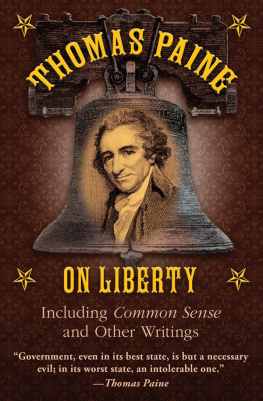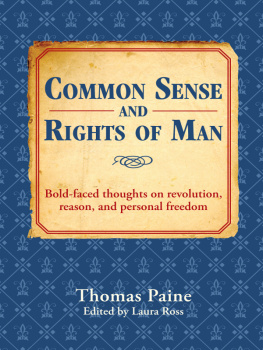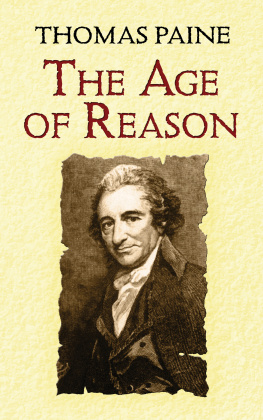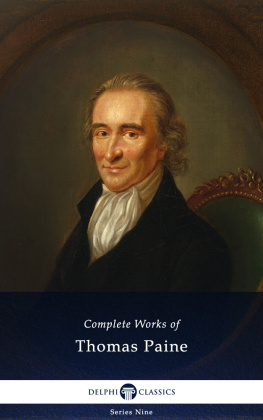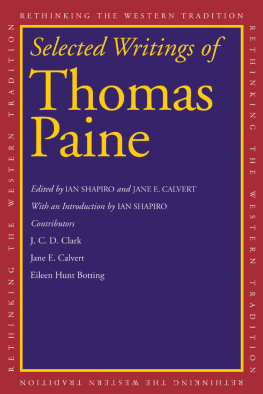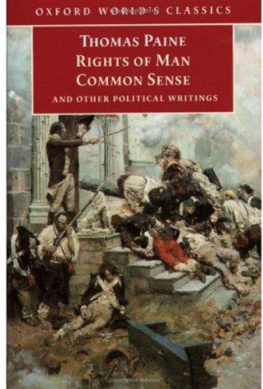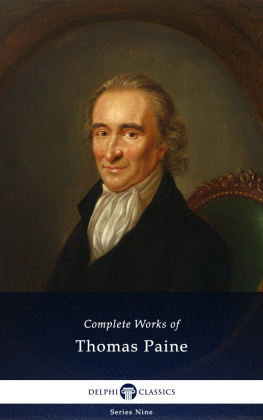Bruce Kuklick 2006. For copyright of individual articles please refer to the Acknowledgements.
All rights reserved. No part of this book may be reprinted or reproduced or utilised in any form or by any electronic, mechanical, or other means, now known or hereafter invented, including photocopying and recording, or in any information storage or retrieval system, without permission in writing from the publishers.
Product or corporate names may be trademarks or registered trademarks, and are used only for identification and explanation without intent to infringe.
The publisher has gone to great lengths to ensure the quality of this reprint but points out that some imperfections in the original copies may be apparent.
The publisher has made every effort to trace copyright holders and welcomes correspondence from those they have been unable to contact.
The editor and publishers wish to thank the following for permission to use copyright material.
American Philosophical Society for the essay: Caroline Robbins (1983), The Lifelong Education of Thomas Paine (1737-1809): Some Reflections upon his Acquaintance Among Books, Proceedings of the American Philosophical Society, 127, pp. 135-42.
Bernard Bailyn for the essay: Bernard Bailyn (1990), Thomas Paine Prepare in Time an Asylum for Mankind, Faces of Revolution, New York: Knopf, pp. 67-84.
Blackwell Publishing for the essay: Mark Philp (1998), English Republicanism in the 1790s, Journal of Political Philosophy, 6, pp. 235-62.
Cambridge University Press for the essay: Ian Harris (1992), Paine and Burke: God, Nature and Politics in M. Bentley (ed.), Public and Private Doctrine: Essays in British History presented to Maurice Cowling, pp. 34-62. Copyright 1992 Cambridge University Press. Reproduced with permission.
Copyright Clearance Center for the essay: Molly Anne Rothenberg (1992), Parasiting America: The Radical Function of Heterogeneity in Thomas Paines Early Writings, Eighteenth-Century Studies, 25, pp. 331-51.
Historical Reflections for the essay: Arthur Sheps (1975), The American Revolution and the Transformation of English Republicanism, Historical Reflections, 2, pp. 3-28.
Imprint Academic for the essay: Jack Fruchtman, Jr. (1989), Nature and Revolution in Paines Common Sense, History of Political Thought, 10, pp. 421-38. Copyright 1989 Imprint Academic, Exeter, UK.
The Johns Hopkins University Press for the essays: William Christian (1973), The Moral Economics of Tom Paine, Journal of the History of Ideas, 34, pp. 367-80. Copyright 1973 Journal of the History of Ideas, Inc. Reprinted with permission of the Johns Hopkins University Press; Gary Kates (1989), From Liberalism to Radicalism: Tom Paines Rights of Man, Journal of the History of Ideas, 50, pp. 569-87. Copyright 1989 Journal of the History of Ideas, Inc. Reprinted with permission of the Johns Hopkins University Press.
Journal of American History for the essay: Winthrop D. Jordan (1973), Familial Politics: Thomas Paine and the Killing of the King, 1776, Journal of American History, 60, pp. 294-308. Oxford University Press for the essay: Ian Dyck (1993), Local Attachments, National Identities and World Citizenship in the Thought of Thomas Paine, History Workshop Journal, , pp. 11735.
Philological Papers for the essay: Elaine K. Ginsberg (1977), Style and Identification in Common Sense, West Virginia University Bulletin, , pp. 26-36.
Political Research Quarterly for the essay: Richard J. Ellis (1992), Radical Lockeanism in American Political Culture, Western Political Quarterly, 45, pp. 825-49. Reprinted by permission of the University of Utah.
Sage Publications for the essays: John W. Seaman (1988), Thomas Paine: Ransom, Civil Peace, and the Natural Right to Welfare, Political Theory , , pp. 120-42; Isaac Kramnick (1977), Religion and Radicalism: English Political Theory in the Age of Revolution, Political Theory, , pp. 505-34.
The University of North Carolina for the essay: Martin Roth (1987), Tom Paine and American Loneliness, Early American Literature , , pp. 175-82. Copyright 1987 Department of English at the University of North Carolina. Used by permission of the University of North Carolina Press.
William and Mary Quarterly for the essays: Michael Durey (1987), Thomas Paines Apostles: Radical Emigrs and the Triumph of Jeffersonian Republicanism, William and Mary Quarterly, , pp. 661-88; Gordon S. Wood (1987), Ideology and the Origins of Liberal America, William and Mary Quarterly, , pp. 628-40; Robert A. Ferguson (2000), The Commonalities of Common Sense, William and Mary Quarterly , , pp. 465-504.
Every effort has been made to trace all the copyright holders, but if any have been inadvertently overlooked the publishers will be pleased to make the necessary arrangement at the first opportunity.
[16]
Religion and Radicalism
ISAAC KRAMNICK
Cornell University
IN HIS REFLECTIONS ON THE REVOLUTION IN FRANCE , Burke lamented the great transformation which he sensed taking place in European civilization. The age of chivalry is gone, he wrote, that of sophisters, economists and calculators has succeeded. The glory of Europe is extinguished for ever. Throughout most of his career, even in the Reflections , Burke was convinced that England was the principal evidence of this most unfortunate transition. He singled out one group as the major modernizing agent in his England the sectarian protestant dissenters. He was right. While many strands of English life contributed to the modernity that undermined the ancien regime, even parts of the aristocracy itself, for example, the cutting edge of change came from these dissenters. They were the boldest voices attacking the traditional order; they were the secular prophets, the vanguard, of a new social order. These talented and industrious protestant dissenters played the decisive role in transforming England into the first bourgeois civilization.
This paper is an effort to reconstruct the ideology of this radical community. It looks at its notions of government, of society, and of the virtuous man. One finds here the articulation of inherited ideas of Lockean liberalism with a progressive and revolutionary fervor that sought to topple all aspects of the aristocratic worldof Burkes beloved age of chivalry. The major force behind this radicalization of Lockean liberalism was its capture in the early stages of the industrial revolution by these protestant dissenters, the embodiment of the entrepreneurial spirit. The spirit of 1776 was the spirit of bourgeois radicalism.
This spirit was a transatlantic radicalism. The radicals in America and England shared many thingsa common enemy, a common nonconformist religious heritage, and a common sense of alienation of being outsiders, albeit superior outsiders, in the closed world of rank, privilege, and power. We all know that the spirit of Harrington, Locke, and the Baron de Montesquieu hovered over American social and political thought in the 1760s, 1770s, and 1780s. Colonial professors, preachers, and presses might also cite Sydney, even Bolingbroke, and Catos Letters of an earlier day. But what absorbed Americans in the decades around the revolution were Wilkes and the writings of the Reverends Price, Priestley, and Burgh. These were the radical kinsmen of the American patriots, holding the eastern flank in the battle against tyranny, corruption, and unrepresentative government.


